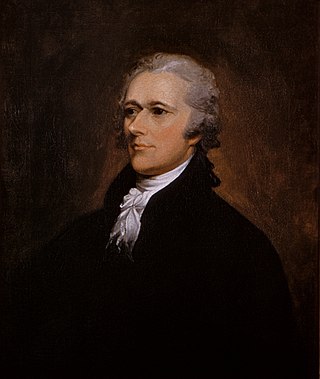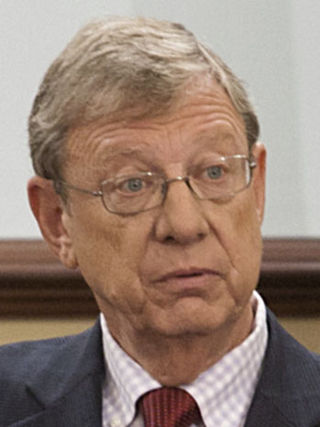Related Research Articles

The Twelfth Amendment to the United States Constitution provides the procedure for electing the president and vice president. It replaced the procedure in Article II, Section 1, Clause 3, under which the Electoral College originally functioned. The amendment was proposed by Congress on December 9, 1803, and was ratified by the requisite three-fourths of state legislatures on June 15, 1804. The new rules took effect for the 1804 presidential election and have governed all subsequent presidential elections.

The 1788–89 United States presidential election was the first quadrennial presidential election. It was held from Monday, December 15, 1788, to Wednesday, January 7, 1789, under the new Constitution ratified that same year. George Washington was unanimously elected for the first of his two terms as president and John Adams became the first vice president. This was the only U.S. presidential election that spanned two calendar years without a contingent election and the first national presidential election in American history.

The 1792 United States presidential election was the second quadrennial presidential election. It was held from Friday, November 2, to Wednesday, December 5, 1792. Incumbent President George Washington was elected to a second term by a unanimous vote in the electoral college, while John Adams was re-elected as vice president. Washington was essentially unopposed, but Adams faced a competitive re-election against Governor George Clinton of New York.

The 1796 United States presidential election was the third quadrennial presidential election of the United States. It was held from Friday, November 4 to Wednesday, December 7, 1796. It was the first contested American presidential election, the first presidential election in which political parties played a dominant role, and the only presidential election in which a president and vice president were elected from opposing tickets. Incumbent vice president John Adams of the Federalist Party defeated former secretary of state Thomas Jefferson of the Democratic-Republican Party.

The 1800 United States presidential election was the fourth quadrennial presidential election. It was held from October 31 to December 3, 1800. In what is sometimes called the "Revolution of 1800", the Democratic-Republican Party candidate, Vice President Thomas Jefferson, defeated the Federalist Party candidate and incumbent, President John Adams. The election was a political realignment that ushered in a generation of Democratic-Republican leadership. This was the first presidential election in American history to be a rematch.

In the United States, the Electoral College is the group of presidential electors that is formed every four years for the sole purpose of voting for the president and vice president. The process is described in Article II of the U.S. Constitution. Each state appoints electors using legal procedures determined by its legislature, equal in number to its congressional delegation totaling 535 electors. A 1961 amendment granted the federal District of Columbia three electors. Of the current 538 electors, a simple majority of 270 or more electoral votes is required to elect the president and vice president. If no candidate achieves a majority there, a contingent election is held by the House of Representatives to elect the president and by the Senate to elect the vice president. Federal office holders, including senators and representatives, cannot be electors.
A running mate is a person running together with another person on a joint ticket during an election. The term is most often used in reference to the person in the subordinate position but can also properly be used when referring to both candidates, such as by saying Joe Biden and Kamala Harris, and Uhuru Kenyatta and William Ruto, were running mates in relation to the presidential elections held in the United States in 2020 and Kenya in 2013 respectively.

In the politics of the United States, elections are held for government officials at the federal, state, and local levels. At the federal level, the nation's head of state, the president, is elected indirectly by the people of each state, through an Electoral College. Today, these electors almost always vote with the popular vote of their state. All members of the federal legislature, the Congress, are directly elected by the people of each state. There are many elected offices at state level, each state having at least an elective governor and legislature. There are also elected offices at the local level, in counties, cities, towns, townships, boroughs, and villages; as well as for special districts and school districts which may transcend county and municipal boundaries.

Federalist No. 68 is the 68th essay of The Federalist Papers, and was published on March 12, 1788. It was probably written by Alexander Hamilton under the pseudonym "Publius", the name under which all of the Federalist Papers were published. Since all of them were written under this pseudonym, who wrote what cannot be verified with certainty. Titled "The Mode of Electing the President", No. 68 describes a perspective on the process selecting the chief executive of the United States. In this essay, the author sought to convince the people of New York of the merits of the proposed constitution. Number 68 is the second in a series of 11 essays discussing the powers and limitations of the executive branch and the only one to describe the method of selecting the president.

Henry Jeffrey Greenfield is an American television journalist and author.

The election of the president and the vice president of the United States is an indirect election in which citizens of the United States who are registered to vote in one of the fifty U.S. states or in Washington, D.C., cast ballots not directly for those offices, but instead for members of the Electoral College. These electors then cast direct votes, known as electoral votes, for president, and for vice president. The candidate who receives an absolute majority of electoral votes is then elected to that office. If no candidate receives an absolute majority of the votes for president, the House of Representatives elects the president; likewise if no one receives an absolute majority of the votes for vice president, then the Senate elects the vice president.

The 2000 United States presidential election in Iowa took place on November 7, 2000, and was part of the 2000 United States presidential election. Voters chose seven representatives, or electors to the Electoral College, who voted for President and Vice President.

The 1996 United States presidential election in Georgia took place on November 5, 1996, as part of the 1996 United States presidential election. Voters chose 13 representatives, or electors to the Electoral College, who voted for president and vice president.

The United States elections of 1788–1789 were the first federal elections in the United States following the ratification of the United States Constitution in 1788. In the elections, George Washington was elected as the first president and the members of the 1st United States Congress were selected.
In the United States, a contingent election is used to elect the president or vice president if no candidate receives a majority of the whole number of Electors appointed. A presidential contingent election is decided by a special vote of the United States House of Representatives, while a vice-presidential contingent election is decided by a vote of the United States Senate. During a contingent election in the House, each state delegation votes en bloc to choose the president instead of representatives voting individually. Senators, by contrast, cast votes individually for vice president.

In the 2016 United States presidential election, ten members of the Electoral College voted or attempted to vote for a candidate different from the ones to whom they were pledged. Three of these votes were invalidated under the faithless elector laws of their respective states, and the elector either subsequently voted for the pledged candidate or was replaced by someone who did. Although there had been a combined total of 155 instances of individual electors voting faithlessly prior to 2016 in over two centuries of previous US presidential elections, 2016 was the first election in over a hundred years in which multiple electors worked to alter the result of the election.
Chiafalo v. Washington, 591 U.S. ___ (2020), was a United States Supreme Court case on the issue of "faithless electors" in the Electoral College stemming from the 2016 United States presidential election. The Court ruled unanimously, by a vote of 9–0, that states have the ability to enforce an elector's pledge in presidential elections. Chiafalo deals with electors who received US$1,000 fines for not voting for the nominees of their party in the state of Washington. The case was originally consolidated with Colorado Department of State v. Baca, 591 U.S. ___ (2020), a similar case based on a challenge to a Colorado law providing for the removal and replacement of an elector who does not vote for the presidential candidate who received the most votes in the state, with the electors claiming they have discretion to vote as they choose under the Twelfth Amendment to the United States Constitution. On March 10, 2020, Justice Sonia Sotomayor recused herself in the Colorado case due to a prior relationship to a respondent, and the cases were decided separately on July 6, 2020. Baca was a per curiam decision that followed from the unanimous ruling in Chiafalo against the faithless electors and in favor of the state.
The United States Electoral College was established by the U.S. Constitution, which was adopted in 1789, as part of the process for the indirect election of the President and Vice-President of the United States. The institution has been criticized since its establishment and a number of efforts have been made to reform the way it works or abolish it altogether. Any change would require a constitutional amendment. In 1971, one of these attempts was almost successful in being proposed to the States. An interstate compact proposal, which would bypass the requirement for a constitutional amendment, is at 76% of successful completion as of August 2023.
References
- ↑ "Book Review: 'The People's Choice: A Cautionary Tale'". Entertainment Weekly .
- ↑ "Fiction Book Review: People's Choice by Jeff Greenfield, Author Putnam Publishing Group $22.95 (309p) ISBN 978-0-399-13812-6".
- ↑ "Fiction Book Review: People's Choice by Jeff Greenfield, Author Putnam Publishing Group $22.95 (309p) ISBN 978-0-399-13812-6".
- ↑ "Book Review: 'The People's Choice: A Cautionary Tale'". Entertainment Weekly .
- ↑ "Two Ticking Time Bombs in the Constitution".
- ↑ "Legal Provisions Relevant to the Electoral College Process". 5 September 2019.
- ↑ "Two Ticking Time Bombs in the Constitution".
- ↑ "Book Review: 'The People's Choice: A Cautionary Tale'". Entertainment Weekly .
- ↑ "Fiction Book Review: People's Choice by Jeff Greenfield, Author Putnam Publishing Group $22.95 (309p) ISBN 978-0-399-13812-6".
- ↑ "THE PEOPle's CHOICE | Kirkus Reviews".
- ↑ "Fiction Book Review: People's Choice by Jeff Greenfield, Author Putnam Publishing Group $22.95 (309p) ISBN 978-0-399-13812-6".